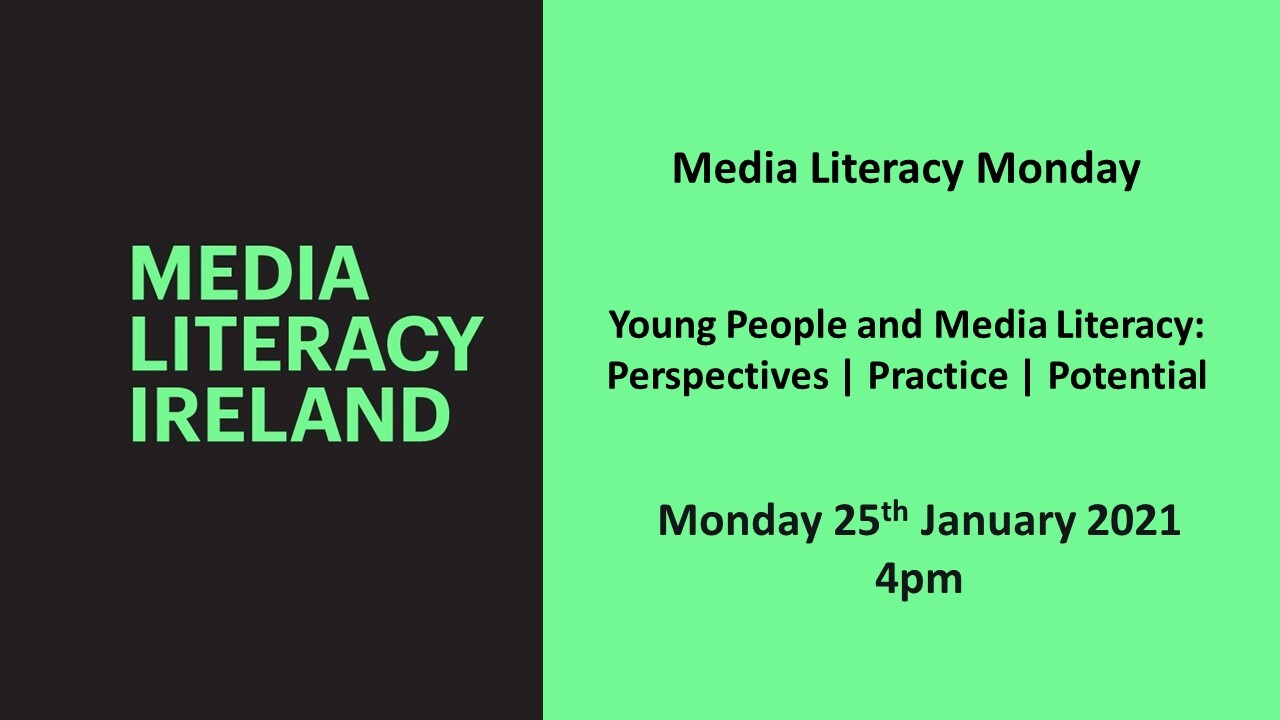By Martina Chapman, National Coordinator, MLI
The first Media Literacy Monday webinar of 2021 took place on Monday 25 January at 4 pm via zoom. With Safer Internet Day around the corner, it seemed appropriate to focus on young people and media literacy. The full webinar is available to watch online.
Perspectives
The event opened with an insightful conversation between Prof. Sonia Livingstone and Prof. Brian O’Neill, Chair of the MLI Steering Group.
During the conversation Sonia noted that the driver for a lot of media literacy activity is based on what people need to know about the Digital World but she cautioned against media literacy initiatives being the ‘go-to’ solution for some of the challenges arising from a situation where digital media is the infrastructure to our lives.
She remarked that recent events have put media literacy on policy agendas again and she hopes that it can become embedded into the structures of government, education and media regulation to facilitate the constant upskilling of people. She also commented on the challenges posed by illegibility of digital media environment and the data ecosystem and the lack of meaningful choices in relation to the use of online services.
“Media literacy is the route to rights in the world.”
Prof. Sonia Livingstone
Based on her work looking at how the UN Convention on the Rights of the Child applies in a digital world, she said that “media literacy is the route to rights in the world”. She argued that children and young people have a desire to learn more and that parents could be an untapped source of knowledge for children, but parents also need support.
Practice
The second part of the webinar was devoted to highlighting some of the media literacy practices that are currently being delivered by MLI members.
- Jane McGarrigle from Webwise highlighted the Connected resource to help young people understand the role of digital technology in their lives and Jane also highlighted upcoming plans for Safer Internet Day.
- Cliodhna Purdue from the Barnardos Online Safety Programme talked about the workshops they run and video lessons, especially T for Think Smart. Cliondhna also highlighted the Be Internet Legends programme developed with Google.
- Philip Arneill from CyberSafeIreland talked about new content in their webinars for children which focus on online literacy / healthy scepticism / mis- and disinformation.
- Alicia McGivern from the Irish Film Institute talked about the new IFI Schools Programme for schools and the range of films available for schools.
- Mark Carpenter from Sky highlighted the Edit media literacy programme from Sky Ireland.
- Mike Glennon talked about a film-makers workshop developed with Sorcha Hyland from Young Irish Film Makers to get young people excited about the spoken word and inspire attendees to make short audio-visual works.
- Nessa McGann from Learning Waves talked about Learning Waves / Skillnet Ireland and their youth-based training programmes focussing on youth participation and understanding of radio.
- Paula Healy from FlirtFM talked about developing the NUI Galway Youth Academy course for primary school students, called Sounds Class! focussing on media literacy and developing audio for 7 to 11 year olds.
- Liz Kanter from TikTok highlighted TikTok’s work including the ‘You’re in Control’ educational videos that presents TikTok’s safety and privacy controls, and their work with Irish stakeholders to promote media literacy during the pandemic using the #antiviral hashtag.
- Matteo Bergamini spoke about the work of ShoutOut UK, a social enterprise aimed at getting more young people involved in politics by running political literacy and media literacy programmes in schools and colleges.
Potential
The final part of the event was a panel discussion with Prof. Sonia Livingstone, Liz Kanter (Director of Policy and Government Relations at TikTok) Eoin Regan, (5th year student and Webwise Ambassador) and Jessica Kavanagh (5thyear student and successful Youtuber with over 390,000 subscribers).
A key message from both Eoin and Jessica to young people was to be yourself online and not try to be someone else for likes, clicks or followers.
Coming from an industry perspective, Liz talked about how community guidelines have to continually change to reflect changes in society – using COVID-19 and medical misinformation as an example. She also highlighted the emphasis that TikTok places on fostering critical thinking among users and encouraging the critical assessment of content and information on the TikTok platform, while at the same time enabling users to express themselves creatively in a safe environment.
Sonia made two very relevant points for MLI to consider in terms of addressing the media literacy needs of young people in the future. Despite the range and quality of initiatives going on, relatively small numbers of young people are being reached. So, scalability of projects is critical, as is the need to reach more marginalised groups. Sonia also noted that learning is a process and it can take years so it is important for people understand what their route of progression might look like and where they might need to go next to improve their media literacy skills.
The full webinar is available to watch online and we are always interested in your feedback so please do take 5 minutes and complete this online survey if you watched it.
The next webinar which will take place on 22 February and will focus on Race and Media. Please register to secure your place and keep an eye out for more details on the website.
Finally, if you have been inspired by the projects highlighted during this webinar and want to look for more please visit the resources section of the MLI Knowledge Base and if you have a project that you would like to promote, please do submit it to us via the website.
